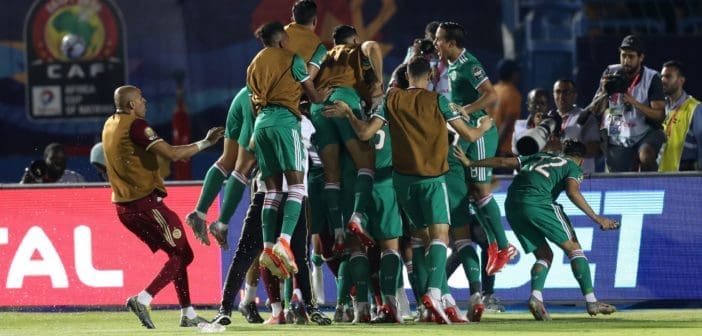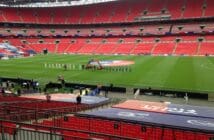The final eight teams at this summer’s African Cup of Nations went into battle over the last couple of days, hoping to get one step closer to lifting the trophy.
Although hosts Egypt were surprisingly eliminated in the last round, there were still plenty of big names left in it, along with some surprise packages who have exceeded expectations this time round.
The first of the quarter-finals saw Senegal take on Benin, conquerors of a strong Moroccan team last time out.
Wednesday’s (10th July) match was played out at a sparsely populated 30 June Stadium in the capital of Cairo and was a laboured affair decided by a single goal.
In a fairly even first half, Benin stifled a disappointing Senegal side with a determined and physical approach. Neither keeper was really troubled, though Benin’s Mikaël Poté went close with a neat flick from a set piece.
With the game goalless at the break, Senegal stepped up the tempo a little in the second half but were nowhere near their fluent best. Gradually though, Aliou Cisse’s men started to create openings and took the lead after some neat play between Idrissa Gana Gueye and Sadio Mané saw Gueye burst through on goal and finish with aplomb.

Photo: @CAF_Online
Either side of Gueye’s strike, Mané had goals correctly ruled out for offside as VAR came into play, and the Senegalese had chances to wrap the game up in the last 20 minutes.
Although they failed to add a second, opponents Benin seemed to run out of steam, and weren’t helped by Olivier Verdon’ s 83rd minute red card as the Senegalese saw the game out.
Despite Senegal never really getting going, they just had a little bit too much class and tournament know-how as they eased into the quarter-finals. Coach, Aliou Cisse was pleased with the win against tough opponents:

Photo: @CAF_Online.
Benin Coach Michel Dussuyer seemed to agree that this had been a step to far for his side who have acquitted themselves very well in Egypt:

Photo: @CAF_Online
Later in the evening, Nigeria faced South Africa at the Cairo International Stadium in the second of the quarter-finals.
Nigeria had been building some momentum and went into the game as lukewarm favourites against the South Africans, who stuttered through the group stage before stunning hosts Egypt in the last-16.
While South Africa had a lot of possession, they were unable to fashion any real opportunities and, as throughout the tournament, were a little blunt as an attacking force. It was Nigeria who carried the greater threat and they took the lead through Samuel Chukwueze’s smart finish at the second attempt following good work from Alex Iwobi.

Photo:@NGSuperEagles. Chukwueze after his opening goal.
Chukwueze’s goal saw Nigeria head into half time with a slender lead in a game of few chances. The second period began with Super Eagles midfielder Oghenkaro Etebo seeing a free kick turned on to the woodwork as the Nigerians looked to double their lead. However South Africa, much improved after the break, drew level in the 71’st minute through a Bongani Zungu header from a Percy Tau free kick.
With the game in the balance, the decisive goal would arrive late on for the Super Eagles as defender William Troost Ekong took advantage of an 89th minute error by South African goalkeeper Ronwen Williams to prod home at the back post.
There would be no way back for South Africa, whose coach Stuart Baxter was pleased enough with his side’s efforts over the course of the tournament, while acknowledging this was a close game that they just got edged out of:

Photo: @CAF_Online
It was a similar view held by South African sport site ‘sport24’ who believed their team had performed solidly enough and put some foundations in place to build on in the future.

Text: sport24
The Nigerian’s on the other hand were pleased to see off a tough South Africa side, with coach Gernot Rohr happy to of reached the last four:

Photo: @CAF_Online
Matchwinner Ekong told ‘All Nigeria Soccer’ he believes that his Nigeria team are in a good place and capable of taking on anyone after building up some momentum in recent matches.
The final two last-eight ties took place on Thursday (11th July), and began with two of the tournament favourites, Algeria and Ivory Coast, meeting at the Suez Stadium.
With the prize of a semi-final spot against Nigeria at stake, Ivory Coast started on the front foot. Max Gradel saw an early effort turned onto the post, while Jonathan Kodjia spurned some early opportunities. Algeria started to gain a foothold and came close through Riyad Mahrez on the quarter hour mark.
The Algerians wouldn’t have to wait long though, as Sofiane Feghouli’s first time finish gave them the lead on 20 minutes. It stayed that way until the break as game settled down into a midfield battle.
Algeria were quick out the blocks at the start of the second half and were given a great chance to double their lead after being awarded a penalty following a VAR review. Striker Baghdad Bounedjah stepped up, but saw his penalty crash off the bar as the score remained 1-0.

Photo: CAF_Online. Algeria’s Bounedjah distraught after his penalty miss.
Despite the missed penalty, Algeria were controlling the game and the tempo until they were undone by a speedy break by Wilfried Zaha, who fed Kodjia to finish from the edge of the box.
The teams traded some very presentable chances in the closing stages, with Riyad Mahrez having an effort superbly cleared off the line by Mamadou Bagayoko, but neither side was able to find a winner and the game went to extra time.
The extra 30 minutes continued in a similar fashion, with both teams having chances to win it. Ivory Coast’s Max Gradel and Check Komara missing great chances for ‘Les Elephantes’, while at the other end Islam Slimani was superbly kept at bay by Ivorian goalkeeper Sylvain Gbohouo.
Ultimately, the game was decided by spot kicks, and after misses by Wilfried Bony (Ivory Coast) and Yousef Belaili (Algeria), Serey Die missed the decisive spot kick to send his Ivory Coast team home and Algeria through to the last four.
‘Eurosport’ were quick to question the antics and emotional manner of the Algerians, suggesting they need more clarity in their thinking if they are to win the tournament.

Text: Eurosport
Algeria manager Daniel Belmadi was pleased to come through the penalty shootout, but felt his team had controlled the game for the most part:

Photo: @caf_online_FR
While despondent Ivory Coast manager Ibrahim Kamara seemed to acknowledge that his side perhaps came up a little short in their attempts to reach the last four.

Photo: @caf_online_FR
Highly respected Spanish sports newspaper AS (English) thought the game had lived up to expectations, labelling it “the best of the tournament”.

Text: AS (English)
Finally, Madagascar met Tunisia in the last of the quarter-finals, at Cairo’s Al Salam Stadium.
While Madagascar had been a revelation in Egypt this summer, surpassing expectations, Tunisia were yet to hit their stride. The Madagascans made the brighter start early on without really troubling the Tunisian back-line. It wasn’t long though before the Tunisians started to get a foothold and dictate the play.
Although the game was goalless at the break, Tunisia made a flying start after the interval, with Wahbi Khazri having a goal ruled out for offside before teammate Ferjani Sassi opened the scoring five minutes later.
Tunisia dominated the second half and doubled their lead through Youssef Mskani on the hour mark. There could have been further goals had it not been for a very good display from Madagascan goalkeeper Melvin Adrien.

Photo: @caf_online_FR. Madagascar fans at the Al Salam Stadium
As it was, Tunisia did manage to grab a third through Naim Sliti in injury time as they coasted through to a semi-final against Senegal. This was a step to far for the Madagascans, who depart following the defeat but with their heads held high.
There was certainly a lot of praise for the Madagascans and their contribution. Leading African football writer Usher Komugisha took to Twitter to show her appreciation.
Madagascar ?? may be out of the tournament but they can be extremely proud of how they performed and fought for their flag.
The Barea made an entire nation proud and inspired a generation to dream big. ?????? #AFCON2019 pic.twitter.com/ogqmmv8UOD
— Usher Komugisha (@UsherKomugisha) July 11, 2019
While manager Nicolas Dupuis admitted his side were outgunned by a very strong Tunisia, while questioning whether he will stay on as Madagascar boss:

Photo: @CAF_Online
On the other hand, Tunisia boss Alain Giresse was keen to focus on the positives of a great display, while looking forward to exciting semi-final clash with Senegal:

Photo: @CAF_Online
And then there were four. Sunday’s (14th July) semi – finals begin with an eye-catching encounter between Senegal and Tunisia at the 30 June Stadium (17:00 UK time).
While Senegal have been consistent, it’s fair to say they still have some gears to reach and will be looking to do so against a Tunisia side that produced their best performance yet in their quarter-final victory over Madagascar.
The recent head to head record between the sides is very close, with each side winning one of the last three meetings, while the other ended in stalemate. It’s likely to be the same here, a very tight game decided by fine margins and potentially, the odd goal.
Arguably the pick of the semi-finals takes place later in the evening as favourites Algeria take on traditional powerhouses Nigeria at the Cairo International Stadium (20:00 UK time).
While the Algerians relied on penalties to get through their quarter-final against Ivory Coast, they have looked the most consistent and cohesive side in the tournament to date, playing some delightful football.
Nigeria haven’t quite hit those heights, but look strong in attacking quarters and are building up a head of steam at the right time of the tournament.
Again, this will be a game decided by fine margins or individual brilliance. However, in a match that genuinely could go either way, I feel the pendulum may just swing in Algeria’s favour.
![Prost International [PINT]](https://prostinternational.com/wp-content/uploads/2021/08/PINTtFontLogoRoboto1536x78.jpg)



